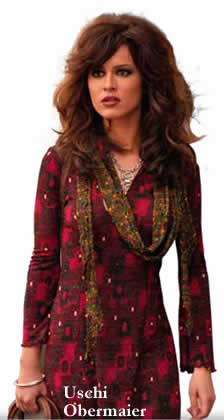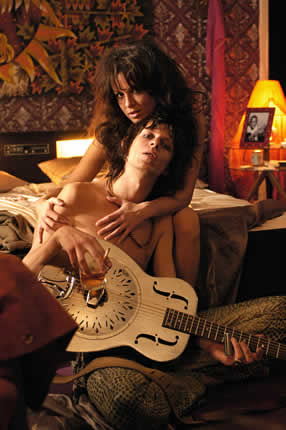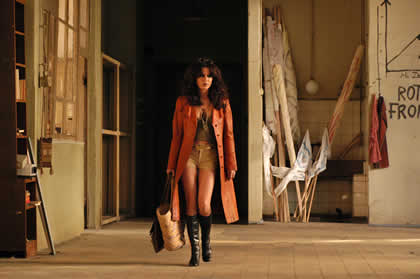 Eight Miles High tells the incredible true story of European wild-child Uschi Obermaier. The film tracks her restless life from a small town girl in rural Bavaria to a fast-living fashion icon in Munich; from free-loving companion of the Rolling Stones to ultimately becoming the embodiment of the 60’s generation of sex, drugs, and rock’n’roll. This is one woman’s story about the discovery of freedom and the price one must ultimately pay to achieve it.
Eight Miles High tells the incredible true story of European wild-child Uschi Obermaier. The film tracks her restless life from a small town girl in rural Bavaria to a fast-living fashion icon in Munich; from free-loving companion of the Rolling Stones to ultimately becoming the embodiment of the 60’s generation of sex, drugs, and rock’n’roll. This is one woman’s story about the discovery of freedom and the price one must ultimately pay to achieve it.
Munich-born Uschi Obermaier celebrated her 60th birthday in September of 2006. She supported the film project of Eight Miles High, authorized the script, consulted with lead actress Natalia Avelon, and visited the set location in India. Her relationship with Dieter Bockhorn began in 1973 until his death from a motorcycle accident in 1984. Obermaier’s autobiography,
“High Times”, was published in 2007 and stayed on the German bestseller lists for 25 consecutive weeks. She now lives in Los Angeles and works as a jewelry designer.
Bijan Tehrani: I watched “Eight Miles High” and found it to be an extraordinary film. How do you feel about the film, being that it is about your own life? Is it very similar to your own experiences?
Uschi Obermaier: Oh yeah. It took such a long time. It took eight years to really get it to the point in which the script was alright. By that time you don’t really feel anything surprising, especially because I had approval of the script. I knew that it was a movie, and not tit for tat, but the essence is important. I think that the film transports the atmosphere of that time very well.
BT: What do you think about Natalia, the actress who played you?
UB: Well, you know, I think it is really difficult for one to accept someone else to play you, because no one is exactly the way that you are. But when I met her for the first time – and she was  actually the only actress they sent, I think it took over a year for casting in the German speaking countries – and when I saw her, I immediately thought ‘well, I can see that’. I think she was doing a great job, but there were little things that probably no one who is having a film being made about themselves will ever be completely happy about. But generally, overall, I think they did a really good job.
actually the only actress they sent, I think it took over a year for casting in the German speaking countries – and when I saw her, I immediately thought ‘well, I can see that’. I think she was doing a great job, but there were little things that probably no one who is having a film being made about themselves will ever be completely happy about. But generally, overall, I think they did a really good job.
BT: How did you communicate with her?
UB: Well, she came to visit me, and she studied me, and we are still friends. I think that says a lot about it.
BT: Were you also present during the shooting of the film?
UB: No. Actually, I went to India because I wanted to watch the shooting, but everything got delayed. I met the staff and crew, but never saw it being filmed.
BT: How much did you communicate with the director?
UB: Very much. Actually it took such a long time, and I got so discouraged because they never got the script down to the essence where I was happy with it. But as soon as Achim Bornhak came in as the director the whole thing turned for the better. Then they got the original screenwriter back on, and then the whole thing worked.
BT: When you look back at your time, and you look at the present time, as far as art, do you think the artists of your era were braver, as far as being independent and trying to explore new ideas?
UB: Oh yeah, of course, they were much more daring, and now they got a bit more mainstream. But you have to consider that at our time, everything we did was absolutely brand new, everything was revolutionary, from the political, the fashion, the music. Everything was really radical. Even me wearing a mini skirt was very rebellious.
BT: As a woman, you were very far ahead of your time. You were very independent and were not held down by ideas that existed before you.
UB: Yeah. This was not a philosophy; it was just feelings that came out of my gut. I just wanted to be free. I didn’t think I wanted to be a rebel; I just wanted to be free and do the things I wanted to do, without anyone hindering me. I wanted to live the experiences in my own skin, it wasn’t enough for me to be told what it was, I had to experience it down to my own bones, to make a judgment for what I liked and didn’t like.
 BT: There are a few sections of the film, like the part in India, that are so beautifully shot. Was it close to your real experience in India?
BT: There are a few sections of the film, like the part in India, that are so beautifully shot. Was it close to your real experience in India?
UB: Yeah, I really think they did a great job. Of course my original bus was in there, and that gives the feeling of what it really was. The bus was like a hippie palace on wheels. They really captured it beautifully.
BT: How many times have you seen the film?
UB: Three times. Well, maybe four times. I saw it with young American directors and actors at a private house, and that was the most enjoyable viewing. They had no idea about my life, and had no expectations, and they were screaming and hollering, and really going with the movie, and I realized I enjoyed the film the most with this crowd. So many young girls are enthralled by it, and that makes me feel really good. I tell them always to do what your heart says, and don’t let yourself fear, because fear in this society kicks out any kind of ambition or wild streak, so they conform. I tell them to go by your heart.
BT: How was Eight Miles High well accepted at the public screening in Germany?
UB: That was very interesting. Nobody had seen the movie yet, but one guy from the press wrote a bad review of it, and the press is like a gang of dogs, one runs ahead and the others follow. They hadn’t even seen it and gave it a bad rap. But when I talk to people, they really enjoyed it. Young people, and people of my generation, they really enjoyed it. The press got off on the wrong foot.
BT: I think personally, being a judge at different film festivals and working as a journalist, I think it is one of the best movies I have seen in the last few years.
UB: Oh really! Oh well, that makes me feel really good. I think it really captures the time, and I think it is a good movie for this time frame.

